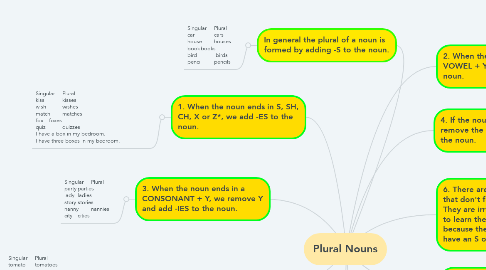Plural Nouns
by Edison Pazmiño Quisingo

1. In general the plural of a noun is formed by adding -S to the noun.
1.1. Singular Plural car cars house houses book books bird birds pencil pencils
2. 1. When the noun ends in S, SH, CH, X or Z*, we add -ES to the noun.
2.1. Singular Plural kiss kisses wish wishes match matches fox foxes quiz quizzes I have a box in my bedroom. I have three boxes in my bedroom.
3. 3. When the noun ends in a CONSONANT + Y, we remove Y and add -IES to the noun.
3.1. Singular Plural party parties lady ladies story stories nanny nannies city cities
4. 7. There are some nouns in English that are the same in the singular and the plural.
4.1. Singular Plural fish fish sheep sheep deer deer moose moose aircraft aircraft I can see a sheep in the field. I can see ten sheep in the field. Sometimes you will hear the word fishes (especially in songs) though it is grammatically incorrect.
5. 5. If the noun ends in a CONSONANT + O, we normally add -ES to the noun.
5.1. Singular Plural tomato tomatoes potato potatoes echo echoes hero heroes Some exceptions: piano - pianos, halo - halos, photo - photos NOTE: Volcano has two correct forms of plural. Both volcanos and volcanoes are accepted.
6. 2. When the noun ends in a VOWEL + Y, we add -S to the noun.
6.1. Singular Plural boy boys holiday holidays key keys guy guys
7. 4. If the noun ends in F or FE, we remove the F/FE and add -VES to the noun.
7.1. Singular Plural life lives leaf leaves thief thieves wife wives Some exceptions: roof - roofs, cliff - cliffs, chief - chiefs, belief - beliefs, chef - chefs
8. 6. There are a number of nouns that don't follow these rules. They are irregular and you need to learn them individually because they don't normally have an S on the end.
8.1. Singular Plural man men woman women child children foot feet tooth teeth goose geese mouse mice There is a child in the park. There are many children in the park.
9. 8. If the noun ends in IS, we change it to ES. Words that end in IS usually have a Greek root.
9.1. Singular Plural analysis analyses basis bases crisis crises
10. 9. If the noun ends in US, we change it to I. Words that end in US usually have a Latin root.
10.1. Singular Plural cactus cacti fungus fungi stimulus stimuli syllabus syllabi Some exceptions: octupus - octupuses (because it is from Greek, not Latin), walrus - walruses


